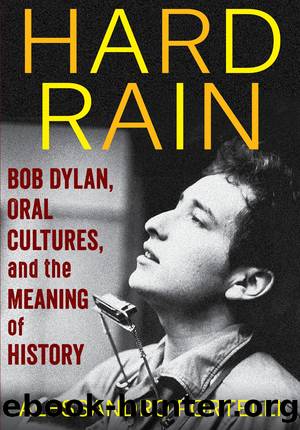Hard Rain by Alessandro Portelli

Author:Alessandro Portelli
Language: eng
Format: epub
Tags: MUS017000, Music/Genres & Styles/Folk & Traditional, HIS016000, History/Historiography
Publisher: Columbia University Press
Published: 2022-05-17T00:00:00+00:00
Mamma mamma damme cento lire che allâAmerica vojo annaâ
Cento lire te le darei, ma allâAmerica no no no
Il fratello dalla finestra je disse mamma lasciala annà â
Vanne via fija maledetta in mezzo al mare pozzi restà â
Quando fu alla metà der mare il bastimento je sâaffonnò ⦠10
(Mama give me 100 lire, I want to go to America
Iâd give you 100 lire, but donât go to America
Her brother spoke from the window: Mama, let her go
OK, go, and youâll be cursed, may you die in the middle of sea
When the boat was halfway across the sea it sank down â¦)11
For those who were left behind, emigration was a loss as final as death: like Dylanâs wandering son, the balladâs wayward daughter sinks in the oceanâstricken by her motherâs curse, and because she would be lost forever anyway. To the mothers at home, emigration does not sound like a bold move in search of a better life, but like a desertion from the struggle for survival that those who stay carry on. These songs evince the pain and resentment of those who cannot foresee a future of social progress and improvement and feel the loss of all the traditional guarantees that supported their way of life.12 In this sense, perhaps, âLord Randalâ may also have a meaning in the third millennium, a time in which âthe newâ takes the form of the class struggle of the top against the bottom, âreformâ means erosion of hard-won rights, and social struggles no longer look forward to revolution but only strive to protect and retain what is left of existing social and economic rights (which is why, like the ballad, they are dubbed âconservativeâ).13
And yet, there are not only moments of dread in history, but also hope for the future. When it seems that the times might be changing, âthe newâ may be perceived not as an aggression from above and outside but also as an impulse of liberation from below. In colonized Ireland, the English authorities were afraid that the traditional Irish salutation, âwhatâs the newsâ (or, in more vernacular form, âwhatâs the craicâ) was a subversive expression of dissatisfaction with the present state of things, if not an outright announcement of revolt. Take a beloved Irish song of rebellion, âKelly, The Boy from Killane.â Written by Patrick James McCall in 1898 to commemorate the centennial of the Irish rebellion of 1798, this song bridges the memory of a rebellious past with the vision of liberation to comeâ1798 to 1916, as it were:
Download
This site does not store any files on its server. We only index and link to content provided by other sites. Please contact the content providers to delete copyright contents if any and email us, we'll remove relevant links or contents immediately.
Wilbur Smith by Gli Angeli Piangono (A4)(381)
Assassin's Creed Valhalla by Elsa Sjunneson(321)
GEORGE SAND by Il marchese di Villemer(235)
La gente e altre seccature by Judith Viorst(205)
Selfie by Giuseppe Riva(188)
The Crèche Keeper's Guild: A Cozy, Quirky Fantasy by Ware Wilkins & Faith Anthony(174)
Divina Commedia by Dante Alighieri & Gabriele Dell'Otto(174)
Catalogue of Oriental Coins in the British Museum, Volume 04 by Unknown(164)
Traditori by Marcello Flores(160)
L'età costituente. Italia 1945-1948 by unknow(156)
Catalogue of Oriental Coins in the British Museum, Volume 02 by Unknown(152)
N by Ernesto Ferrero(150)
Catalogue of Oriental Coins in the British Museum, Volume 08 by Unknown(144)
Catalogue of Oriental Coins in the British Museum, Volume 01 by Unknown(142)
Master drawings : the Woodner collection by Woodner Ian(141)
Catalogue of Oriental Coins in the British Museum, Volume 07 by Unknown(137)
Catalogue of Oriental Coins in the British Museum, Volume 09 by Unknown(137)
Will ti presento Will by John Green;David Levithan(136)
Catalogue of Oriental Coins in the British Museum, Volume 03 by Unknown(136)
